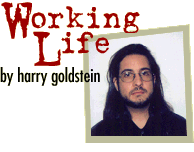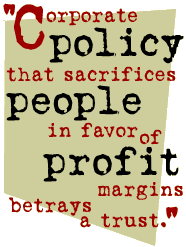WORK & MONEY

EMPLOYEES WANT MOORE & EXECUTIVES SHOULD LISTEN
Published May 6, 1996

Previous columns
by
Harry Goldstein
Greeted with polite applause, Michael Moore, director of Roger and Me and TV Nation, addressed a dining room full of MBA alumni of Dowling College, a business college located on the former Vanderbilt estate on Long Island.
All gussied up in a blue blazer over jeans and sporting a spanking new MTV cap, Moore talked about everything from the OJ trial to corporate crime. The thread linking these seemingly disparate subjects together?: The need for our society to redefine "crime," away from the stereotypes of urban thugs mugging, raping and murdering with impunity to something more in line with reality, i.e. the mugging of the America worker by avaricious corporations.
Moore himself is a study in contrasts. A regular Joe gifted with an acerbic wit and an eye for the absurd, he's made a career of tweaking Corporate America's nose while joining forces with mega-corporations like Time Warner -- which distributed Roger and Me and helped make it the highest grossing documentary in history -- to make money. For Moore, sleeping with the enemy is a necessary evil, one that affords him the opportunity to reach large audiences -- hence his reluctance to put TV Nation into syndication, preferring instead to wait for another network to pick up the show, which ran one season on NBC and another on Fox. It is surely a sign of the bottom line logic of the modern multinational that Time Warner, NBC (GE) and Fox (Rupert Murdoch) cared not a whit about what Michael Moore said about them or their ethics as long as advertisers bought air time during his show.
Moore's mission as a media producer and working class advocate is two-fold: raise awareness among his middle America audience by producing shows that are as entertaining as they are educational while at the same time exposing corporate greed at every opportunity. At the risk of preaching to the converted, Moore tries to rile his natural constituency into action.
And it works. According to Moore, thousands of people in cities across the country turned out to greet Crackers the Corporate Crime Fighting Chicken (one of Moore's more inspired TV Nation inventions) and sic Crackers on their home town corporate baddies.

The luncheon crowd at Dowling uncomfortably choked down their chicken. Potential victims of Moore's satiric lens, these current and future MBAs were probably hoping for a few more easy laughs than Moore was able to provide, though it seemed like most of them just plain didn't get the ones he managed to sling out like so many chicken cordon bleus. Moore obviously relished the opportunity to plant the seed of corporate responsibility while these future captains of industry cleaned their sparkling china plates. Leaner means meaner, Moore emphasized as he spread wide his rhetorical net to ensnare the union leaders of the 1980's for selling their members down the river by giving up salary and benefits in deals supposedly designed to save jobs -- a strategy that backfired as corporations posted record profits and coined a new obscenity: down-sizing. He also sketched out a rogue's gallery of capitalists run amok, including the chairman of AT&T; who, according to Moore, bloating the value of his stock portfolio by $5 million the day he announced the layoffs of 40,000 AT&T; employees because Wall Street investors regard down-sizing as good business practice.

Whether Moore is documenting the woes of dues paying, blue collar workers tossed out of work by a car company looking to maximize profits or talking about the riches reaped by executives by firing full time employees and replacing them with temps, his point is well-taken: corporate policy that sacrifices people in favor of profit margins betrays a trust. Perhaps job security is an outdated concept to companies whose profits can soar every time they tighten their belts a notch, but it's a real issue to people who know they could be booted onto the street and into the unemployment line at any time. Why should they pledge loyalty to a company that won't reciprocate? Without the prospect of receiving compensation that keeps pace with the cost of living, people begin to question why they should concern themselves with the quality of their work. Ultimately bad personnel policies translate into bad business practice. And that's a bottom line those Dowling MBAs should read very carefully.
Harry Goldstein is a writer and editor living in Manhattan. His work has appeared in Utne Reader, American Book Review, Promethean, AltX, word.com, and other periodicals.
© 1996 Harry Goldstein, All Rights Reserved
